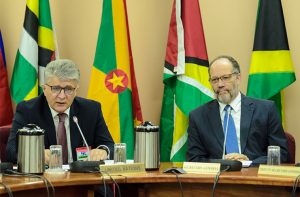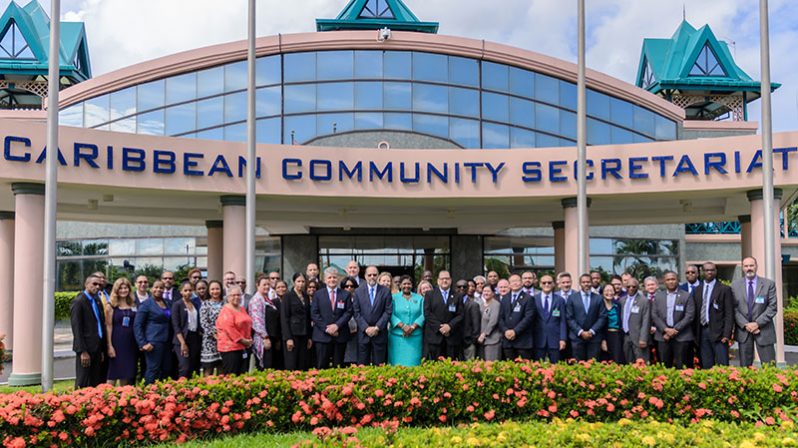CARIBBEAN counties are leading the way on climate action, adaptation and mitigation and the international community should support these efforts by providing the necessary public and private resources.
This is according to Head of the UN Delegation, Assistant Secretary-General for Political Affairs, Miroslav Jenca, who made remarks on the same at the 10th General Meeting between CARICOM and the United Nations (UN) system on Tuesday.
This year’s meeting marks the 10th Anniversary of Biennial Meetings between the two since the very first which was held in 1997 in New York.
It is being held in Guyana at the CARICOM Secretariat from July 23-24 where Heads and representatives of the UN, CARICOM institutions, specialised agencies and associated institutions are meeting.
There, Jenca observed that the multi-agency cooperation of the UN with CARICOM to adopt and implement a Counter-Terrorism Strategy is just one of the many examples of how the shared cooperation has become ever more successful. He expressed gratitude on behalf of the Department of Political and Peacebuilding Affairs’ (DPPAs) for the event and that it was represented by twice as many persons as at the 2015 General Meeting in Georgetown.
“I think I can say on behalf of all UN colleagues that we are impressed with your fantastic organisation of this meeting, especially because we know how incredibly busy you are with your countless tasks,” he said.

Meanwhile, for the first time, the General Meeting will see discussions on the issue of human mobility, as an increase in the flow of migrants into CARICOM member states has been observed. Speaking on the same was CARICOM Secretary-General Ambassador Irwin LaRocque, who said that the meeting is geared towards discussing matters crucial to the sustainable development of the Region. In relation to the issue of human mobility to be discussed, post-disaster displacement will also be up for deliberation for the first time. The matter deals with the right to adequate shelter of people affected by disasters, of which shelter is often the primary need in the post-disaster phase.
Other topics to be covered during the two days include debt sustainability; financing for development; blacklisting; the withdrawal of correspondent banking relations; crime and security; Small Island Developing States (SIDS) and the 2030 Development Agenda; youth and human resource development; food security, agriculture and fisheries; and non-communicable diseases, HIV/AIDS and pandemics.
Meanwhile, LaRocque said that the threat of climate change still “hangs heavy” and there is urgent need for enhanced action to fight global warming.
He informed delegates that CARICOM Heads of Government have realised that climate change contributes to an increase in natural disasters, environmental degradation and affects biodiversity.
Additionally, UN Secretary-General António Guterres has recognised the challenges and economic constraints which impeded the development of some states in the Region and has vowed to strengthen UN support to CARICOM.
Guterres also called on the 10th General Meeting to review the UN-CARICOM cooperation and explore areas where this can be expanded.
“It is a partnership that the member states of CARICOM rely on, one that has become more effective in our coordination and implementation; one that will continue to evolve in response to changing needs and priorities and one that on this tenth anniversary we can be proud of,” he stated.



.jpg)









